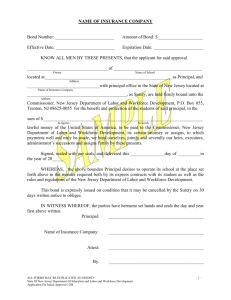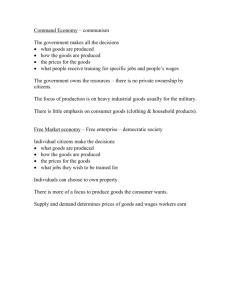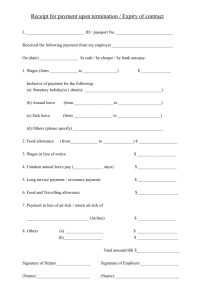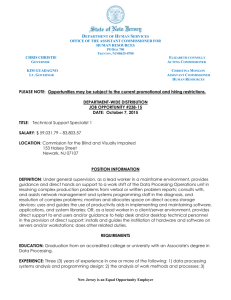Chapter 173, Laws of New Jersey, 1965:
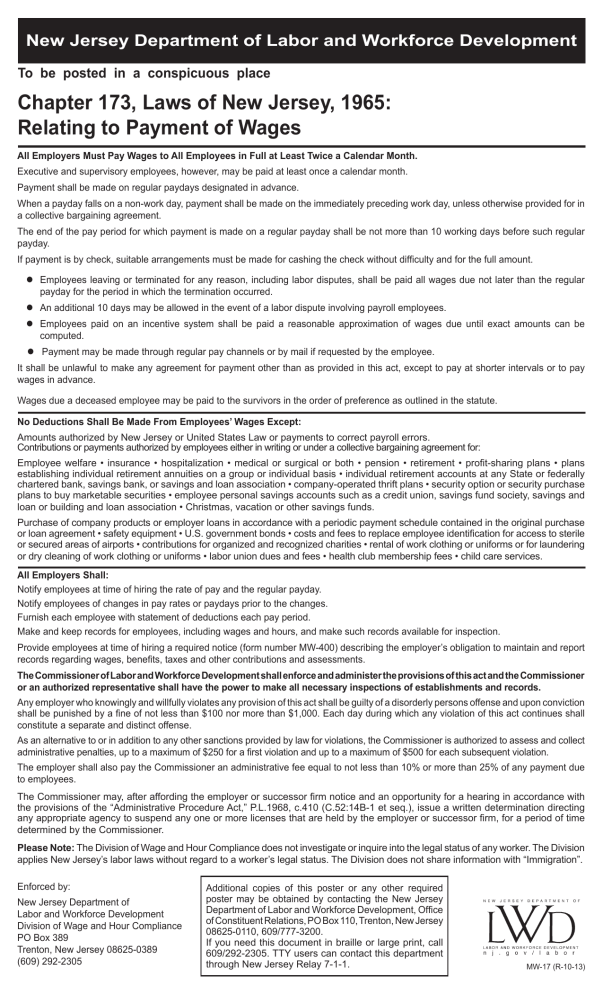
New Jersey Department of Labor and Workforce Development
To be posted in a conspicuous place
Chapter 173, Laws of New Jersey, 1965:
Relating to Payment of Wages
All Employers Must Pay Wages to All Employees in Full at Least Twice a Calendar Month.
Executive and supervisory employees, however, may be paid at least once a calendar month.
Payment shall be made on regular paydays designated in advance.
When a payday falls on a non-work day, payment shall be made on the immediately preceding work day, unless otherwise provided for in a collective bargaining agreement.
The end of the pay period for which payment is made on a regular payday shall be not more than 10 working days before such regular payday.
If payment is by check, suitable arrangements must be made for cashing the check without difficulty and for the full amount.
l Employees leaving or terminated for any reason, including labor disputes, shall be paid all wages due not later than the regular payday for the period in which the termination occurred.
l An additional 10 days may be allowed in the event of a labor dispute involving payroll employees.
l Employees paid on an incentive system shall be paid a reasonable approximation of wages due until exact amounts can be computed.
l Payment may be made through regular pay channels or by mail if requested by the employee.
It shall be unlawful to make any agreement for payment other than as provided in this act, except to pay at shorter intervals or to pay wages in advance.
Wages due a deceased employee may be paid to the survivors in the order of preference as outlined in the statute.
No Deductions Shall Be Made From Employees’ Wages Except:
Amounts authorized by New Jersey or United States Law or payments to correct payroll errors.
Contributions or payments authorized by employees either in writing or under a collective bargaining agreement for:
Employee welfare • insurance • hospitalization • medical or surgical or both • pension • retirement • profit-sharing plans • plans establishing individual retirement annuities on a group or individual basis • individual retirement accounts at any State or federally chartered bank, savings bank, or savings and loan association • company-operated thrift plans • security option or security purchase plans to buy marketable securities • employee personal savings accounts such as a credit union, savings fund society, savings and loan or building and loan association • Christmas, vacation or other savings funds.
Purchase of company products or employer loans in accordance with a periodic payment schedule contained in the original purchase or loan agreement • safety equipment • U.S. government bonds • costs and fees to replace employee identification for access to sterile or secured areas of airports • contributions for organized and recognized charities • rental of work clothing or uniforms or for laundering or dry cleaning of work clothing or uniforms • labor union dues and fees • health club membership fees • child care services.
All Employers Shall:
Notify employees at time of hiring the rate of pay and the regular payday.
Notify employees of changes in pay rates or paydays prior to the changes.
Furnish each employee with statement of deductions each pay period.
Make and keep records for employees, including wages and hours, and make such records available for inspection.
Provide employees at time of hiring a required notice (form number MW-400) describing the employer’s obligation to maintain and report records regarding wages, benefits, taxes and other contributions and assessments.
The Commissioner of Labor and Workforce Development shall enforce and administer the provisions of this act and the Commissioner or an authorized representative shall have the power to make all necessary inspections of establishments and records.
Any employer who knowingly and willfully violates any provision of this act shall be guilty of a disorderly persons offense and upon conviction shall be punished by a fine of not less than $100 nor more than $1,000. Each day during which any violation of this act continues shall constitute a separate and distinct offense.
As an alternative to or in addition to any other sanctions provided by law for violations, the Commissioner is authorized to assess and collect administrative penalties, up to a maximum of $250 for a first violation and up to a maximum of $500 for each subsequent violation.
The employer shall also pay the Commissioner an administrative fee equal to not less than 10% or more than 25% of any payment due to employees.
The Commissioner may, after affording the employer or successor firm notice and an opportunity for a hearing in accordance with the provisions of the “Administrative Procedure Act,” P.L.1968, c.410 (C.52:14B-1 et seq.), issue a written determination directing any appropriate agency to suspend any one or more licenses that are held by the employer or successor firm, for a period of time determined by the Commissioner.
Please Note: The Division of Wage and Hour Compliance does not investigate or inquire into the legal status of any worker. The Division applies New Jersey’s labor laws without regard to a worker’s legal status. The Division does not share information with “Immigration”.
Enforced by:
New Jersey Department of
Labor and Workforce Development
Division of Wage and Hour Compliance
PO Box 389
Trenton, New Jersey 08625-0389
(609) 292-2305
Additional copies of this poster or any other required poster may be obtained by contacting the New Jersey
Department of Labor and Workforce Development, Office of Constituent Relations, PO Box 110, Trenton, New Jersey
08625-0110, 609/777-3200.
If you need this document in braille or large print, call
609/292-2305. TTY users can contact this department through New Jersey Relay 7-1-1.
MW-17 (R-10-13)
